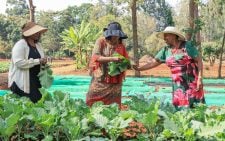Energy-efficient cooking stoves ease life in village

Kepher Otieno
It is 8 am. As the sun casts a warm glow on the grass, Millicent Odira, 45, is busy molding energy saving stoves in Opapo village, Migori County.
Each day she wakes up at 5 am to start working on a new flourishing energy-efficient cooking stoves enterprise in her home.
“I make up to 50 energy saving stoves per day. At times, if I wake up early I can make up to 70,’’ she explains.
This is now her daily routine. Odira is happy that a majority of people in rural areas are now looking for the most reliable form of energy for household use.
The discovery comes after decades of relying on traditional open flames (three stones) that consumed lots of firewood and emitted smoke.
Women and girls used to walk for long distances in search of firewood. The recent ban on logging of trees has been yet another blessing in disguise to her business.
In recent times, many households and learning institutions have resorted to energy saving cooking stoves, with wood fuel becoming scarce.
Unlike in the past when many relied on charcoal stoves, today families are quickly turning to energy saving stoves in the villages.
Odira says since she invested in the clean energy business in 2008 her enterprise has grown due to high demand for her products.
Her journey in the clean energy business dates back then, when she was trained by a foreign corporation on how to install improved cook stoves.
Through Migori County’s Department of Social services, she was introduced to the Improved Cook Stoves Association in 2013.
This is where she was trained on assembling and installation of institutional improved cooking stoves.
“It is after gaining skills on installation of institutional improved cooking stoves that I embraced the clean energy business,’’ she says.
She has been selling the energy saving stoves to her friends, families, customers, institutions and women groups in Migori.
“I make up to Sh30,000 on a good day. And sometimes Sh20,000 to Sh10,000 depending on the market dynamics,’’ Odira explains.
After all expenses including paying the clay molders, she saves at least between Sh5,000 to Sh10,000 per day.
Odira is always on call for utility services to train more women in clean cooking technologies to underserved communities.
With the business proceeds, she has managed to build a permanent house and pulled down her initial grass thatched hut.
In February 2020, Odira was introduced to Practical Action’s Women in Energy Enterprises in Kenya (WEEK II) project.
She has since attended training on marketing and networking, record keeping on productive uses of energy, all backed by the WEEK II project.
Her business has today expanded to the extent she has registered it as Mildra Green energy and Technology.
The business is specialised in product development and in-house cook stoves development.
“Licensing of my business has enabled people to gain trust in my energy business which has in turn helped me get more clients.’’
Odira is, however, not alone in the now thriving clean energy business in Migori County.
In Rongo town, Caroline Akinyi, 38 is also making a livelihood out of her briquette business.
When the Business Hub visited her enterprise, we found her equally doing well in the energy sector. She says residents have learnt the advantages of the energy saving stoves and the business now earns her good cash.
Pressure to sell
“The trade is reliable and sustainable because the type of goods is not perishable and don’t have the pressure to sell fast at a loss,” she says.
For Akinyi, her business is providing fuel for the energy saving stoves. She sells noncarbonated briquettes in Rongo, Awendo, Misadhi, Ranen, Sare, Rakwaro and Riosiri markets.
Sharon Atieno, Gender and Advocacy officer at Practical Action, says they have been assisting in training and empowering women entrepreneurs in the energy sector within Migori, Homa Bay, Kisumu, Kakamega, Siaya, Nairobi and Makueni counties.
“We are working closely with individual women and women groups in such trades to motivate them grow their skills,’’ she adds.












